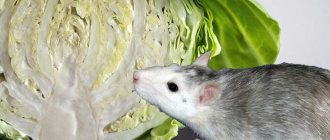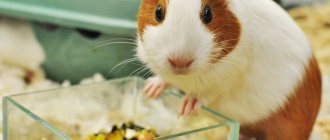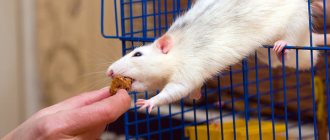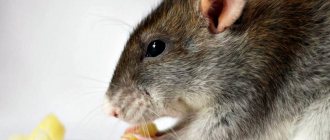Prohibited Products
Any prepared food, especially fried or spicy food, is prohibited for rats; canned food; sweet; alcoholic drinks; sweet drinks.
It is also undesirable to feed your pet from the owner's table: the food sold in specialized stores is already balanced and includes all the necessary vitamins. If you give your pet food from the table, the animal may refuse its food. Afterwards, it will be very difficult to wean the animal off junk food.
If you want to pamper your pet with fruits or vegetables, it is very important that they are in season, otherwise there is a risk of poisoning from harmful pesticides that are used for quick growing and long-term storage.
Grains and cereals - which ones should you avoid?
Grains form the main diet of rats, but it is necessary to know which grains can be fed and which cannot.
- Wheat is allowed for rats, but requires supplementation with other types of grains. Very high in calories. Wheat can be diluted with rice, buckwheat, corn and other grains.
- Buckwheat is considered dietary, has few calories, and can be added to the diet of rats.
- Corn, on the contrary, is high in calories; it is advisable to give it less often than others and as an additive to other grains.
- Oats - can cause fermentation, so it can be given, but in small quantities.
- Rice is considered to have little nutritional value, so it is advisable to feed either wild or brown rice.
- Semolina does not contain anything beneficial for the rat’s body, and veterinarians advise excluding it from the diet.
- Millet or barley - they can be given in the form of ready-made porridge for weakened animals, or for nursing offspring; adults can sometimes be given for variety.
Some general details about feeding a decorative rodent
Eating is a favorite pastime of rats, but they can get carried away or, in general, eat what they shouldn’t, so the pet owner must pay great attention to the selection and preparation of the correct diet for the animal. In order for the nutrition to be as balanced as possible, it is best to create a diet according to a special scheme, which implies that the following products will be given to the animal regularly:
In order for the nutrition to be as balanced as possible, it is best to create a diet according to a special scheme, which implies that the following products will be given to the animal regularly:
- Cereals. Grains should form the basis of the diet you plan to feed your pet rat. You can buy special sets of cereals in pet stores, cook porridge from cereals (without adding oil to them), give boiled pasta, bread, boiled corn;
- Vegetables, herbs and fruits are what you can “treat” and feed your rat deliciously every day. Moreover, a “green” diet is necessary for the animal’s full functioning and for its health. Don't feed your rat exclusively carrots and cabbage - these pets love variety and need a wide variety of vitamins;
- You can provide your animal with additional vitamin supplementation by buying him special treats enriched with microelements and other useful substances. For rats, pet stores sell vitamin lozenges, sticks, and candies;
- Protein-rich foods are also necessary for the rat, but they should be given much less frequently than vegetables and grains - it is enough to offer protein to the rodent once every two days. Meat, seafood, cottage cheese, cheese, and yogurt can be used as protein foods. Do not give your rat protein in large quantities - an excess of this substance is harmful to the animal’s body; rodents with an abundance of protein in the blood age faster.
The animal must feed regularly - a rat can live for a maximum of two days without food. But it’s also not worth it to be overzealous and stuff the animal with food all the time - rats can gain excess body weight, and they will develop obesity.
Vegetables and greens
Vegetables are very healthy and are allowed to be consumed daily, but in small quantities.
- Cabbage - any kind is undesirable for consumption, because... causes fermentation.
- Broccoli – can be given as an occasional treat.
- Radishes/turnips/radishes and some legumes (beans, lentils) cause increased discomfort due to gas formation, so their consumption is undesirable.
- Carrots/zucchini/pumpkin are very healthy, rich in vitamins, so their consumption is recommended.
- Eggplants/artichokes – only boiled ones are allowed; when cooking for an animal, adding salt or spices is not required.
- Cucumbers/beets – can cause stomach upsets in the form of diarrhea, so their consumption is undesirable.
- Potatoes have no value and are even prohibited in their raw form.
- Dill/parsley/celery, etc. are very beneficial for the digestion of rats, so it is advisable to add greens to their food daily.
- Tomato/sorrel – contain acid, consumption by rats is undesirable.
What can and cannot be given to rats - food table
| Type | Name | How often and why? | Quantity (per time) | In any form | Video |
| Berries and Fruits | Apricot | Rare, like a treat | 1 teaspoon | Fresh | |
| Berries and Fruits | Avocado |











